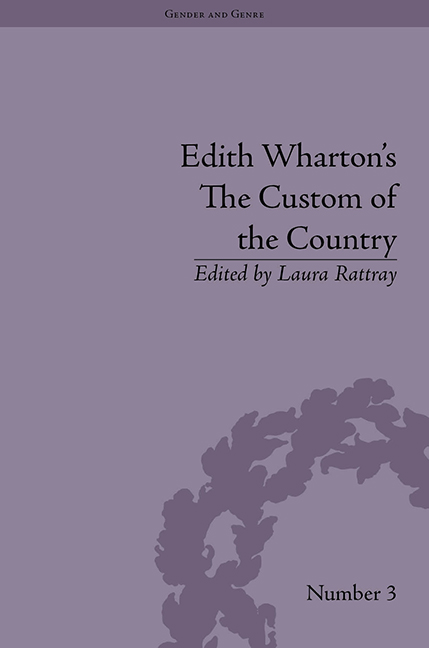Book contents
- Frontmatter
- CONTENTS
- Acknowledgements
- Editorial Note
- List of Contributors
- List of Figures
- Introduction
- 1 The Custom of the Country: Edith Wharton's Conversation with the Atlantic Monthly
- 2 When the Reading Had to Stop: Readers, Reading and the Circulation of Texts in The Custom of the Country
- 3 ‘Don't Cry – it ain't that Kind of a Story’: Wharton's Business of Fiction, 1908–12
- 4 Worst Parents Ever: Cultures of Childhood in The Custom of the Country
- 5 Crude Ascending the Staircase: Undine Spragg and the Armory Show
- 6 ‘It's Better to Watch’: Compulsive Voyeurism in The Custom of the Country and The House of Mirth
- 7 A ‘Mist of Opopanax’: Mapping the Scentscape of The Custom of the Country
- 8 Landscape with the Fall of Undine
- 9 Girls from the Provinces: Wharton's Undine Spragg and Cather's Thea Kronborg
- 10 Men at Work in The Custom of the Country
- 11 ‘Lost in Translation’: Financial Plots and the Modernist Reader in The Custom of the Country
- Notes
- Index
9 - Girls from the Provinces: Wharton's Undine Spragg and Cather's Thea Kronborg
- Frontmatter
- CONTENTS
- Acknowledgements
- Editorial Note
- List of Contributors
- List of Figures
- Introduction
- 1 The Custom of the Country: Edith Wharton's Conversation with the Atlantic Monthly
- 2 When the Reading Had to Stop: Readers, Reading and the Circulation of Texts in The Custom of the Country
- 3 ‘Don't Cry – it ain't that Kind of a Story’: Wharton's Business of Fiction, 1908–12
- 4 Worst Parents Ever: Cultures of Childhood in The Custom of the Country
- 5 Crude Ascending the Staircase: Undine Spragg and the Armory Show
- 6 ‘It's Better to Watch’: Compulsive Voyeurism in The Custom of the Country and The House of Mirth
- 7 A ‘Mist of Opopanax’: Mapping the Scentscape of The Custom of the Country
- 8 Landscape with the Fall of Undine
- 9 Girls from the Provinces: Wharton's Undine Spragg and Cather's Thea Kronborg
- 10 Men at Work in The Custom of the Country
- 11 ‘Lost in Translation’: Financial Plots and the Modernist Reader in The Custom of the Country
- Notes
- Index
Summary
In 1948, Lionel Trilling observed that Henry James's novel The Princess Casamassima ‘belongs to a great line of novels which runs through the nineteenth century as … the very backbone of its fiction’, that is, the novel about ‘the Young Man from the Provinces’. According to Trilling, this subgenre – which includes (among others) Balzac's Père Goriot, Flaubert's Sentimental Education and Dickens's Great Expectations – tells the story of the young man who goes off to ‘seek his fortune’ in the enticing but bewildering world of the great city. The young man, usually ‘equipped with poverty, pride, and intelligence’, is ‘likely to be in some doubt about his parentage’ he ‘move[s] from an obscure position into one of considerable eminence in Paris or London or St. Petersburg’. Although he meets obstacles, ‘it is not his part merely to be puzzled and hurt … [H]e is concerned to know how the political and social world are run and enjoyed; he wants a share in power and pleasure and in consequence he takes real risks’. Through his experience readers ‘have learned most of what we know about modern society, about class and its strange rituals, about power and influence and about money, the hard fluent fact in which modern society has its being’.
Trilling and others, however, have said little about what one might call the younger sister of the novel about the young man from the provinces – the novel about the girl from the provinces.
- Type
- Chapter
- Information
- Edith Wharton's The Custom of the CountryA Reassessment, pp. 127 - 142Publisher: Pickering & ChattoFirst published in: 2014



